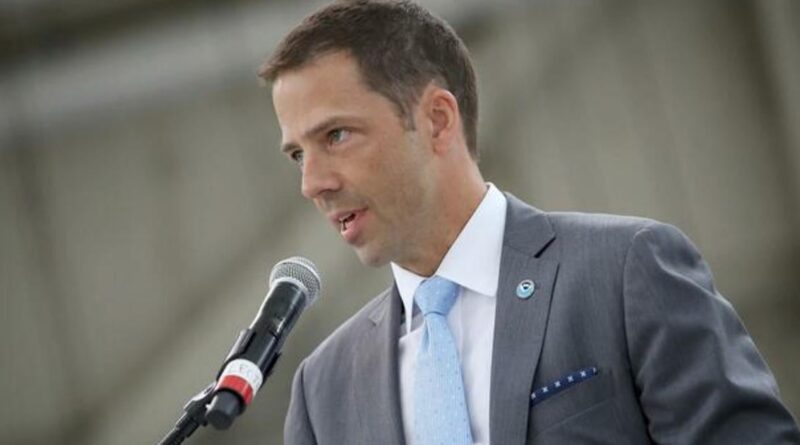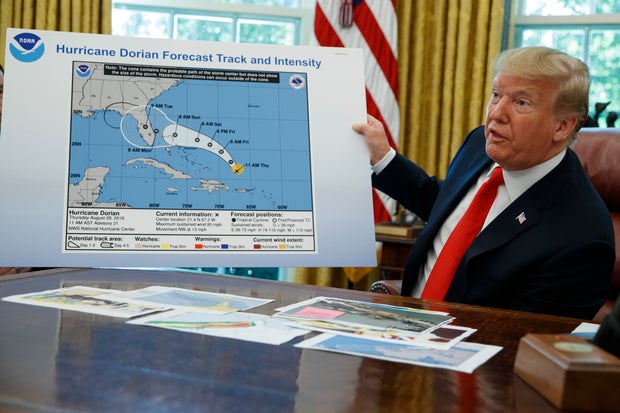Former top NOAA scientist under Trump issues a “Sharpie-gate” warning
The former top government scientist during President Trump’s first term in office has a cautionary tale to tell about the politicization of science. It involves Neil Jacobs, Mr. Trump’s nominee to lead the National Oceanic and Atmospheric Administration (NOAA).
Jacobs, who led the agency on an acting basis during Mr. Trump’s first term, was reprimanded for ethics violations in what became known as “Sharpie-gate” — when the president held up a hurricane forecast map with black marker appearing to extend the storm’s potential path into Alabama.
Craig McLean served during Mr. Trump’s first term as acting chief scientist of NOAA, which monitors the health of the oceans and the warming of the climate, and runs the National Weather Service, which issues weather warnings. In his first interview, McLean told CBS News many scientists “are worried about President Donald Trump’s return to office — after he undermined science in his first term.”
“Folks realize that they may be in for a storm,” said McLean.
McLean said he feels that way partly because of what happened in early September 2019. The National Weather Service said a storm, Hurricane Dorian, would move up the Atlantic coast. Mr. Trump tweeted that Alabama was in the storm’s path.
It wasn’t.
Twenty minutes later, the National Weather Service in Alabama accurately tweeted, “Alabama will NOT see any impacts from #Dorian.”
Three days later in front of cameras, Mr. Trump held up a week-old map that was altered with a black marker to portray the hurricane’s path as if it had initially been headed for Alabama, as he tweeted.
“That was the original chart,” Mr. Trump said. “It was going to hit not only Georgia but Florida. It was going toward the Gulf.”
The controversy became known as “Sharpie-gate.”
Evan Vucci/AP
Two days later, without McLean’s knowledge, the leadership at NOAA released a statement backing Mr. Trump and criticizing the work of the weather forecasters.
“To have a political process unplug the public’s trust, that got me stirred,” McLean said. “That gave me a sense of rage.”
McLean demanded investigations. According to a report by a panel of the National Academy of Public Administration for the National Oceanic and Atmospheric Administration and a U.S. Department of Commerce Office of Inspector General report about the incident, the investigations concluded that the statement backing Mr. Trump was “driven by external political pressure,” through a “request from the White House then-Acting Chief of Staff,” and that Jacobs, the head of NOAA who has been nominated again, “violated the Code of Ethics for Science Supervision and Management set forth in Section 7.01 of NOAA’s Scientific Integrity Policy when they failed to engage the Birmingham WFO in the development of the September 6 Statement.”
The National Academy report said: “Further, the Panel finds that they engaged in misconduct intentionally, knowingly, or in reckless disregard of the Code of Scientific Conduct or Code of Ethics for Science Supervision and Management in NOAA’s Scientific Integrity Policy.”
According to the inspector general report, Jacobs felt pressured.
“In Dr. Jacobs’s view, he could make the statement more accurate, but the Department would issue, or would cause NOAA to issue, a statement one way or another,” the report said. “If he resigned or were fired, he reasoned, the final statement likely would have been worse and more inflammatory.”
CBS News reached out to Jacobs for comment, but has not yet received a response. A spokesperson for NOAA said it does not comment on nominations and has no contact with nominees until they are confirmed.
McLean requested NOAA’s top leaders acknowledge the investigative findings. Shortly after, he was relieved of his position. McLean stayed on with NOAA, in another position, and eventually retired.
McLean has a stark message about hurricane warnings.
“People’s lives are on the line,” McLean said.
But NOAA’s science is about more than hurricane warnings. It underpins how corporations and insurance companies predict the ever-growing risks of climate disasters and helps farmers choose the best time to plant as weather patterns shift.
Project 2025, which has served as a roadmap for the new administration, calls on Mr. Trump to “break up NOAA.”
The White House did not reply to questions sent by CBS News. During nomination hearings for Howard Lutnick, Mr. Trump’s pick to lead the Commerce Department — which oversees NOAA, Lutnick said he does not support breaking up NOAA.
Project 2025 claims NOAA is “one of the main drivers of the climate change alarm industry.”
McLean said there’s cause for alarm.
“We’re required by law to give the full picture, and if there’s a reason to not be alarmist, what is that,” McLean said. “What we’re seeing is alarming, is very alarming.”



